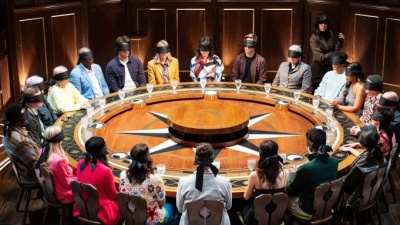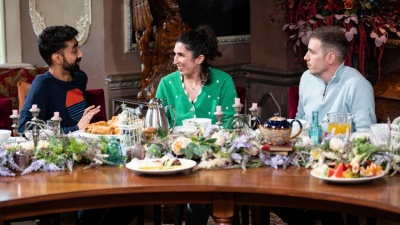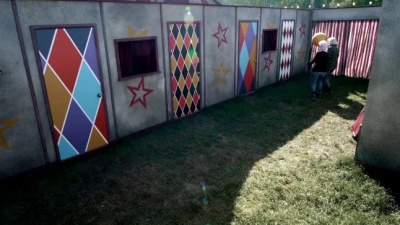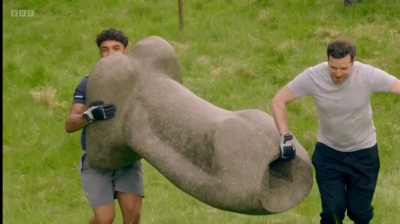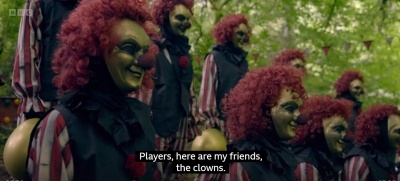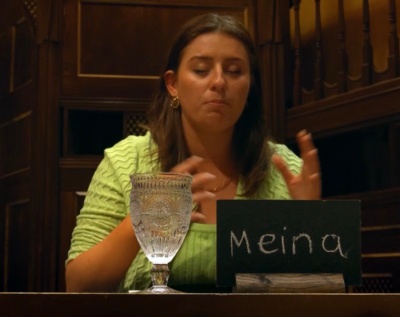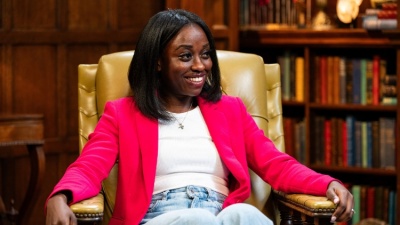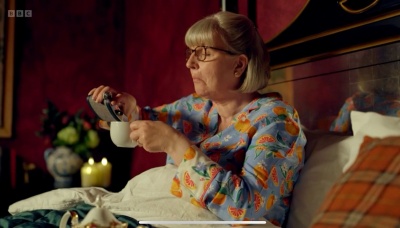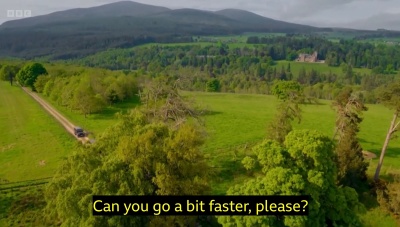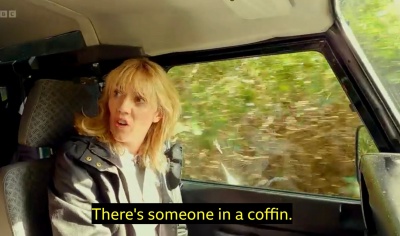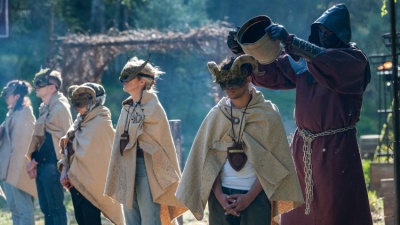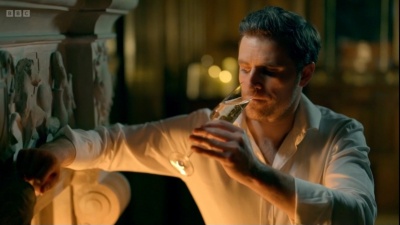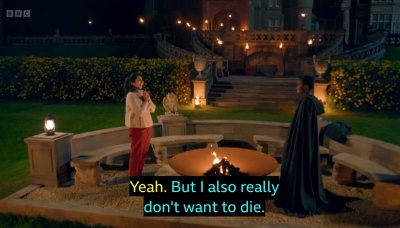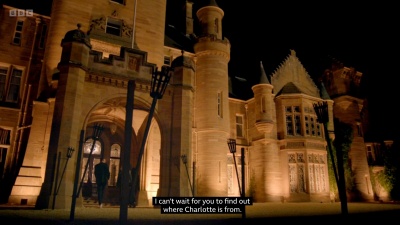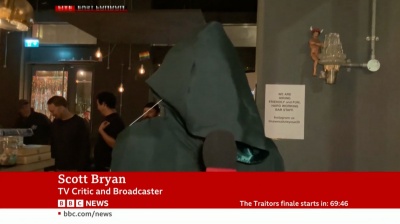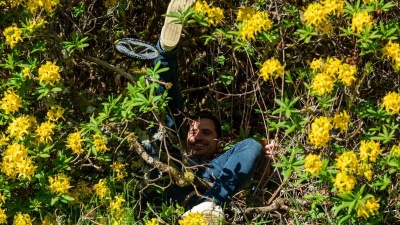Weaver's Week 2025-02-16
Last week | Weaver's Week Index | Next week
It's that time again. We've had three weeks to see the final, but if you're still going through The Traitors, stop now. Do not read further, come back to this Week when you've caught up.
Contents |
The Traitors
Studio Lambert Scotland for BBC1, 1-24 January
Our annual review of television's most devious and immersive reality show. We know who the traitors are, we were watching as they were selected in the opening episode.
We know who was banished, who was murdered. Who surprised us all, who left without making an impact, who was carried through the rounds as a Useful Idiot only to prove smarter than the average contestant.
As is traditional, The Traitors began with all of the contestants getting on a steam train and going to Claudia's Castle. The first challenge was that three of them were not going to arrive. The train stopped, and each carriage was invited to eject one of the players inside. What will happen to them? Will they be out of the game permanently? Surely not: Claudia said in the first series that the only way to leave The Traitors is through murder or banishment, and this is neither.
Could this be a Mission?
Turned out that this was the first episode's attempt at a Mission for the pot. As a Mission, it is by far the weakest we've ever seen: the producers doubtless intended that one of the carriages would be full of "no, won't go", but reckoned without the inherent pleasantness of civilian contestants. Maybe the challenge would have been more difficult for the self-regarding Yankees who also use the castle around this time.
And a general sense of "is that it" pervaded the bulk of the Missions this series. Episode two had the "blow something up" idea they've used in previous series, and potentially prevent a murder; the idea was that the Traitors would not want this to happen and might give incorrect answers, but they could lean back and let the group be wrong on their own account because that's what always happens on Wie is de Mol?. A longboat challenge asked players to sacrifice themselves for money and to complete the challenge; we got rifts in the group without any particular nastiness, albeit with the majority of players saving themselves from murder.
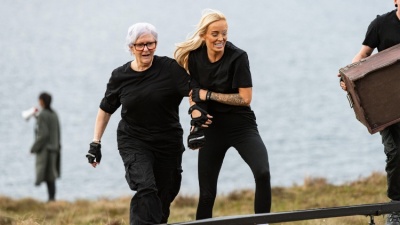 Linda (left) is helped up the hill to safety. Claudia has her megaphone out again. (Studio Lambert Scotland)
Linda (left) is helped up the hill to safety. Claudia has her megaphone out again. (Studio Lambert Scotland)
But that was unusual. A challenge to form rifts in the group, not to heal them. Previous series have almost always had their Missions as large-scale challenges, the group's to pull together and work to increase their common pot. It's a break for the players to do something different, and it provides light and shade for the viewer. This year, both the activities and the discussions are pulling in the same direction. And it made The Traitors more even-tempered, more monotonous, and ultimately a lesser show.
Remember the players from the first episode? They came back in episode four, having taking the rail replacement stagecoach service, and ended up in cages through some plot phlebotinum. Which two would come back? That'll be decided by the other players, who "vote" by finding and posting gold coins for their preferred player; the third player is banished and exiled to The Traitors Uncloaked, Ed Gamble's BBC2 spin-off (which we treat as an extension of the main show).
Knock-Knock from Takeshi's Castle came back, along with some clowns, balloons, and a big pointy needle from Claudia's knitting bag. Describe the door you're going through in enough detail that others can recognise it, and hope you survive to make another choice; all rather fun, and the shields were an afterthought, bolted on at the end.
An exceptionally mean challenge for the middle of the series, where contestants nominate another to have sticky yucky molasses poured over their head; guess one of the people who poured gunk over you to eliminate them otherwise you're gone. Not only was this dangerous enough to turn to "poured over the back of their head" after the first gunking, but it was mean and dispiriting. There was absolutely no jeopardy about winning the money, it became purely a mission for a shield. And we're not here for a mission all about the shield, we're here for thrills and spills and Sidney turning left when he meant other left. Hit the mark the producers wanted, but left us cold.
Later in the series, the old "identify a sound when you hear it over the phone and bring the right one back" challenge, leaning into the spooky horror vibes that pervaded this series. There was a "drag things up a hill to assemble a statue and are you absolutely sure they didn't do this on one of the Raven spin-off series?" challenge, which ended in five minutes of arguing and bickering about who would get the shield. All this rancour completely eclipsed the "nail technician" dragging a massive rock up a steep hill by herself, when two grown men were struggling with another massive rock.
The penultimate challenge was a triple set of minigames: a "spot the lady", The Bong Game played by the creepy dolls, and another hunt for money. Seen the ideas before, but re-used in novel ways, and a useful way to re-use some of the props. The final day's challenge, though, was completely lacking: drop bags of money onto a target while dangling from a helicopter.
Why are we going on so much about the missions? They are important, the missions set the colour palette for the entire show. Series 1 was primary colours, bold and adventurous, making a statement. Series 2 last year was a bit more muted, bright with occasional dark patches. This year, the missions were a sludge of dark colours, falling in line with the ever-paranoid discussions in the castle. It led to a lot of yelling and crying and some really outrageous personal attacks.
Be wrong, and be loud
The greatest technique to survive as one of the Faithful has always been to be firm in your convictions, and have convictions that are well away from the existing Traitors. Target a Traitor and be believed, and you're going to be murdered. Target a Traitor and be ignored, and you may survive to the end (like Maddie in the first series).
Most unusually, there weren't any failed putsches against a Traitor: once the table felt convinced that someone was a Traitor, they moved quickly and ruthlessly as a group. That ability to think as a group also meant that many, many Faithful players were ousted. Anyone who questioned the group's consensus would be picked out. Ah! Dan is thinking, Dan is assessing the evidence himself, Dan must be a Traitor. Dan turns out to be Faithful, and the ringleaders against him feel no regret, and choose to learn absolutely nothing.
At times, it felt like the players were trying to out-guess what the producers had done. After last year's sausage-fest, perhaps the initial Traitors were majority (or exclusively) women; nothing in the game ever disproved that theory. There were two sisters in the show, they were open about their relationship from the start. One of them was a Traitor, and she was discovered early. Suspicion may have been heightened, in part, because making a sister a Traitor (or both of them Traitors) would be exactly what a production company would do.
Buoyed with that success of thinking like a producer, the group next turned its fire on the resident medical practitioner. "Ooh, a doctor, they heal people by day... and murder them by night" seemed to be the vibe. A vibe based on absolutely nothing the doctor had done, just on the prejudices of the group, and their stereotype of what a reality show producer would do. Reality opened the door on this stereotype and popped its balloon: the doctor was Faithful to the end.
Right from the start, the Faithful chose to pick off the intelligent players, the ones who could coolly analyse the situation and work out who the Traitors were. These are the people the Traitors need to eliminate, and will do so through the nightly murder. Why were the Faithful doing the Traitors' job for them? The very first murder was of the cleverest player in the room, so the Traitors knew their job; why are the Faithful throwing out prime murder targets?
Someone argued that it's a bit like wider society. "Put enough stupid people together and they turn on the doctors, anyone with a university degree, anyone who speaks more than one language" – truly, the bigotry of low horizons.
Camp Claudia
Camp (adj): a sensibility that revels in artifice, stylisation, theatricality, irony, playfulness, and exaggeration rather than content. Don't expect it to take itself the least bit seriously.
The first two series of The Traitors revelled in their own world: Claudia's line in jumpers, the décor in the castle, a fine line in tea and scones. This year, the jumpers remained, but the world was clowns and fire and general vindictiveness. Far less fun, and undercut much of the show's distinctive points.
That said, there were still some moments of pure theatre. Every year, there's a "murder in plain sight" challenge: a kiss on the cheeks, a drink from a poisoned goblet. This year, the Traitors would scribble four names on gravestones on a painting while everybody else was out of the room; the nominated players were then whisked off to play a "death match".
And there were so many molehills made into mountains. Would Linda be spotted as she scrawled on the painting? (No.) Would anyone be able to read her handwriting? (Apparently so.) Will the producers sell a Death Match Card Game (As Seen on TV's The Traitors) for oodles and boodles of money? (Of course, but you could always play it with a standard deck of cards.)
And then they play the Death Match in a foggy graveyard, in the dead of night, lit only by a few wisps, some candles, and those massive TV lights. It's made to look like great telly. And we don't know the result until the last possible moment – during the next day's Mission, when the players are brought out of their coffins by the team who follow some very simple clues. (Seriously, these clues are so simple they wouldn't fox Seaweed from Swashbuckle for more than a few days.)
Sure, we may carp at the simple clues, but the focus was not on navigation – this was a treasure hunt but it didn't need to be Treasure Hunt. And we might roll our eyes at the thought of contestants in coffins again – until we remember that last year, the survivors were never in the dark. It's a moment to stick in the memory.
Another came very late in the game, when contestants were encouraged to "think like a Traitor", and move pieces around on the chess board. Once they'd placed their piece – identified who was the "leader of the group" or the "most irrelevant", a big giant figure moved about the board and might bump into an actual person. Have we unexpectedly re-invented The Dark Knight for a new generation?
 Claudia failed to get Caleb Grant's line. (Studio Lambert Scotland)
Claudia failed to get Caleb Grant's line. (Studio Lambert Scotland)
Oh what an atmosphere
Previous series of The Traitors have shown a clear difference between the BBC and NBC versions. They might be filmed in the same channel, and use the same set and mostly the same challenges, but the shows were very different. By and large, the BBC versions were calm, co-operative, everyone realised that it's "only" television and did their best not to let disagreements fester. If we wanted people shouting at each other for no reason, we only had to watch the dispiriting NBC edition, where loudmouth bores would provide more bad feeling than is good for you.
This year, the BBC edition finally succumbed to ill-feeling. Disagreements escalated to become personal, and these personal vendettas altered the course of the game. So few choices to murder after the Longships challenge. So much rancour after the molasses game. The eliminated player that night went because he wasn't involved in a discussion in another car, about confirming who had slimed whom; in his car, the pact of silence was kept. Contestants took great offence at any slight, real or perceived. Some have argued that the winners included bullies at times: one with his baseless pursuit of the doctor, another for flying off the handle any time they were considered as a traitor.
And it's to the producers' discredit that this happened. They are the ones responsible for setting the actions, for making the challenges to sow discord and ill-feeling. They are the ones who cast the show, who researched and selected our top 25. Praise for the many good bits goes to the producers, they'll also need to cop for the bad bits.
Towards the end of the series, there was a relaxed evening where the remaining players said what they'd do with the money if they won it. Explained a bit about their back story, why they were playing. It's a bonding experience for the players, one of many they'd had over the weeks of filming. It's a bonding experience between the players and the viewers, the first time we'd been allowed to get to know these players as people.
Rules and gameplay
Two major innovations for this year's series. One was announced right at the start of the series: on the final day, contestants wouldn't reveal if they were Faithful or Traitor. At the last round table, and at the fire pit, contestants would say their goodbyes and leave.
The other innovation was the "Seer", a chance for one contestant to ascertain the true allegiance of one other finalist. The Seer thought they could use their power to confirm their ally was on-side, and could not have chosen a more interesting target, because their "100% Faithful" was actually zero per cent faithful.
Positioned just at the start of the grand final, we viewers got a sterling cliffhanger, full of dramatic tension – we knew what would happen, the folk on screen did not. But a moment's thought shows that a public accusation of treachery would be fatal to both involved, as it proved to be. In retrospect, the Seer needed to be awarded a little earlier – perhaps with eight in the game – and awarded in secret so the Traitors had no clue who the Seer was. It would give the Seer time to sow seeds of doubt, but they'd need to work to remove their Traitor.
Other people online have suggested other roles from the Werewolf party game – "the Umbrella" would hand out a shield to protect one other person each night from murder, "the Bodyguard" would take the murder on behalf of their nominated player, "the Traitor In Training" will be forced to become a Traitor when the next one is banished – and if the trainee goes first, the Traitors get two murders that night. And so on, and so on, and so on. We're not great fans of too many roles in the game, and it would quickly become very confusing for the viewer.
The grand final, though, really suffered from these new conditions. Unable to know that they'd made the correct choice at the round table, contestants allowed their paranoia to take over, deserving players were denied because of someone else's prejudices. Considering The Traitors as a drama, it's a failure: this is not who these people are, the relationships we've spent four weeks watching and observing and building up are trashed for ten minutes' tension.
Worse, the whole series became completely redundant. The finale boiled down to "do you trust this person with £90,000?" They could have done that on night one. What have we learned about the other players? It doesn't matter one iota.
Now, it is entirely possible that this is a specific ending to the specific circumstances of BBC series 3. As much as we might like to, we will not say that it's a completely broken format point – not just yet. But if the same silent finish is used in other series, and they also end in paranoia and rancour, perhaps the producers will accept that it just doesn't work.
Another thing that just doesn't work is the recruitment strategies. At the start of the series, Claudia selects some Traitors. If their number is ever reduced to two, they have the option to "seduce" – offer a place as a Traitor to one of the Faithful. Should there ever be just one Traitor left, that becomes an "ultimatum" – join the Traitors or be murdered at once.
Two practical results of this. There is no point catching Traitors early, as they will just spawn again and corrupt the Faithful; better to follow the obvious Traitor, keep them in, and see where their alliances seem to be. In all three BBC series, the producers have insisted that there are at least two Traitors at the penultimate round table, and at least one (ideally in a field of five) at the last round table. This is an open goal for metagaming.
And in all three BBC series, a newly-recruited Traitor has come in the final week, let slip something about the existing Traitor who was moving quite well below the waterline, and blown apart their game plan. It's getting a tad too predictable, and the producers might do something – such as give the sole Traitor the option to just kill and not bother with an ultimatum on the final murder night. Sure, we might lose the final Traitor in episode 11, but that doesn't mean the game will finish – indeed, we'd say that could be very interesting indeed.
The producers had two perfect opportunities to do something very different. The new players were re-introduced after the first Traitor had been banished. Would it have been possible for the Traitors to nominate one of them to join their ranks – if that person was allowed into the castle. And at the Death Match, they could have invited the Traitors to meet the final two: one of them would be murdered, the other would be compelled into the Traitor ranks. But these opportunities were allowed to slide.
Overall thoughts
The Traitors is now the most popular returning show on television, it averages more viewers per episode than I'm a Celebrity. This fact deserves note, and congratulations to all involved.
We have a note of caution, as the rise of The Traitors reminds us of how Big Brother ascended from nothing to cultural domination in two years; after a fourth series that didn't live up to inflated expectations, the producers over-reacted and made a different and more nasty show, and it was ruined. Our abiding message to the producers: keep it upbeat, we don't want Fight Night at the castle.
As a show, The Traitors remains a dichotomy. We have the brain admiring the Traitors and everyone's tactics; we have the heart cheering for the Faithful and our favourite players. As soon as there's no-one to cheer for, or root against, the show grinds to a halt, and – for us – that happened in the final.
During this series, desperate scribblers in the trade press completely confected a "row" about how many Scottish people work on The Traitors. Does it matter if the fourth assistant picture grader's granny once lost a tooth on a bar of Highland Toffee and hence is entitled to a Scottish passport? No. It doesn't affect the programme one jot. It just matters to accountants and regulators. The whole "row" presumes that beancounters in general (and OFCOM in particular) make any useful contribution to society, and it was hyped to high heaven by hacks who evidently don't have anything substantial to say.
And one piece of heart-warming news. One of the finalists would have donated his share of the prize pot to charity, had he won through. Viewers donated over £90,000 to Mencap in honour his late brother – the entire prize fund for the series. Well done, young warriors!
In other news
The Neighbourhood is a new commission from ITV, from its internal programme-making division. Twelve families move into houses on a street. They'll live on the street, meet challenges to build the pot, and will also have to vote each other out of their houses. Twelve primetime episodes, hosted by Graham Norton. Is this the former-favourite-button's latest answer to The Traitors with more than a bit of Survivor? We'll find out in due course.
The Box has been picked up by ITV. That's a format from Norway where celebrities are put in boxes, taken to all sorts of places, and given challenges when they arrive. Tenders have been sent to relevant production companies.
Quizzy Mondays
Krish Hook sailed to victory on Mastermind, taking the Masters snooker tournament as his specialist subject. Another low-scoring week, where all four contenders finished in the teens.
Four Opinions booked their place in the Only Connect final, with things that happened on the Titanic, the flow of rivers, and the songs of Andrew Lloyd Webber all gave points. Cat Cows finished two points behind, spotting things names after a lion's anatomy, the wives of Kings Louis of France, and a complete guess on recent changes to Heathrow Terminals. Neither team knew about The 8-15 from Manchester, the Ross King / Charlotte Hindle kid's show of the early nineties, proving it really is tough at the top.
Something of an upset in the first University Challenge group match, as Christ's Cambridge beat Imperial College by 180-160. Christ's had the better of the opening exchanges, but Imperial opened up a 40 point lead and stayed around there for most of the match. After the four minute warning, Christ's got three starters in a row to tie the scores, and the last starter to pull ahead. The better team won – Christ's were 28/50 with two penalties and 60% on the buzzers. Imperial's domination of the bonuses deserted them, just 52% tonight – had they managed to get to the 70% of previous rounds, they could have won.
Good to see Gladiators: Epic Pranks a show for the CBBC channel. Home of the Year returns to RTÉ1 (Tue), and Masterchef Usa to the Watch channel (weeknights). It's the grand final of Love Island All Stars (VM2 and ITV2, Mon). Got Talent returns on Saturday (VM1 and ITV).
To have Weaver's Week emailed to you on publication day, receive our exclusive TV roundup of the game shows in the week ahead, and chat to other ukgameshows.com readers, sign up to our Google Group.


